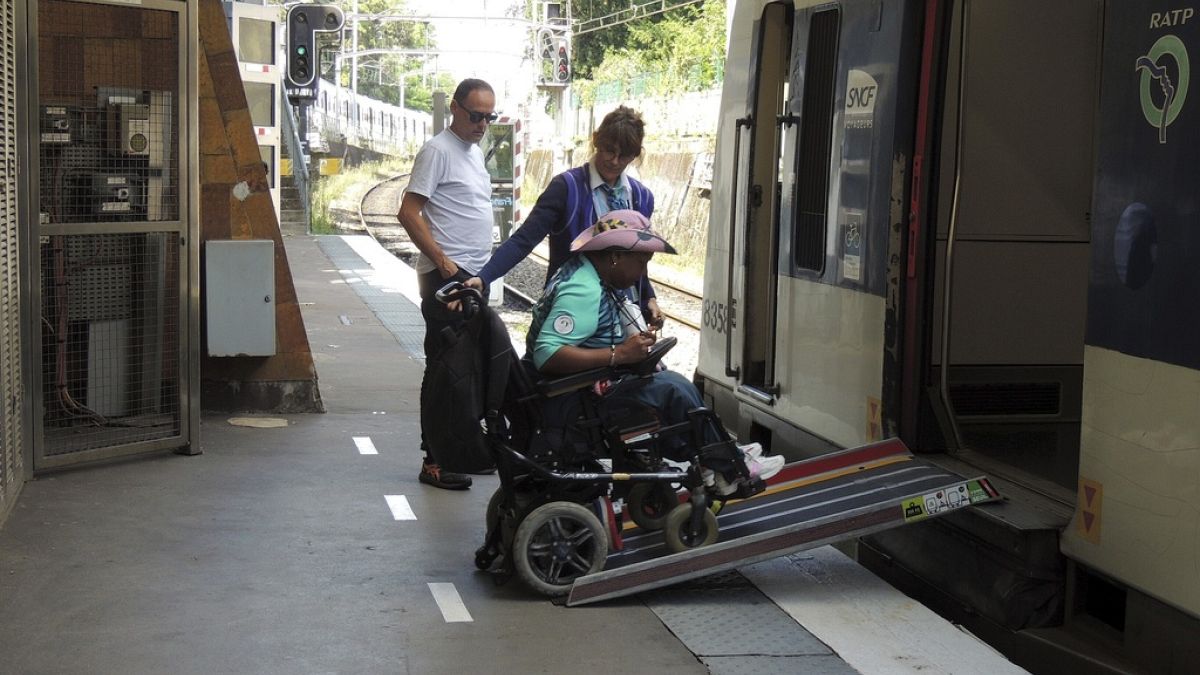Olympic and Paralympic Games organisers' key promise ahead of the sporting event was improved accessibility. But non-profit organisations say not enough has been done to make navigating the French capital easier for people with disabilities.
Getting around Paris is a challenge of its own when you're using a wheelchair like Franck Maille, a former para-athlete and representative of APF France Handicap, a disability charity.
Although the French capital promised to improve accessibility for the Paralympic Games, which opened on Wednesday night, the city's public transport network remains nearly impossible to navigate for passengers with reduced mobility.
The first stage of Maille's arduous journey starts in Nanterre, in the western suburbs of Paris.
For him to get into the city centre, he needs to take the RER, an inner-city train. Two out of five are advertised as "fully accessible", but the reality is a whole different story.
"I have to take the elevator and go down to the front desk. And that's where all autonomy ends for me because I need a rail agent's help," Maille sighs.
At the front desk, the agent needs to call the arrival station to make sure the lifts are working there.
If they aren't, Franck always has a plan B and a plan C for how to get to his destination.
"If the elevators aren't working, I go home," he says. "And if I don't have an important appointment, I either take the car or not. But I have to leave well in advance. You always have to think ahead and come up with different routes, it's exhausting."
Assuming that Maille's train journey continues, another agent then has to manually pull out a special ramp for wheelchair users — a lengthy procedure that eats up 20 minutes of Maille's time.
"Things can sometimes go wrong: just yesterday, a rail agent forgot about me and didn't come with the ramp," explains the 53-year-old former top-level swimmer. "The train conductor had to wait for someone to come and help me exit."
Adults with disabilities reported experiencing frequent mental distress almost five times as often as adults without disabilities, according to a 2018 report by the Centers for Disease Control and Prevention, the US' national public health agency.
Isolation is a driving factor, according to Maille: "Some disabled people commit suicide because they can't take it anymore. They think we're not considered as human beings. We're fed up, creating an accessible society is taking way too long."
Physically and psychologically exhausting
Improving accessibility was one of the key promises of the organisers of the Paris games, dubbed "The Games for Everyone".
"In terms of accessibility, no, it's not the 'Games for Everyone'," Maille says. "Yes, they're working to improve, there's a will to do things well, but are they doing them correctly? Perhaps they should ask the people actually concerned for their advice."
Between broken elevators and some impatient passengers who cut in front of Maille, the journey can be mentally and physically taxing.
"It's exhausting," Maille says. "Physically, because you're covering long distances in the hallways. Psychologically, because you have to pay attention to everyone, to everything, like the crowds, the traffic."
The centuries-old Parisian metro is one of the worst modes of transport when it comes to accessibility — only one metro line, the newly completed line 14, is fully accessible.
But even there, Maille always needs to keep his eyes open for obstacles as his wheelchair nearly gets stuck in the lift door gap.
His favourite mode of transport remains the tram which is fully accessible and he has no issues getting on and off the platform.
On the last stage of the trip by bus, also advertised as 100% accessible, Maille encounters more issues.
The bus station has been deviated due to the games. He needs to travel 10 more minutes to the next one.
Moreover, not all bus stops are equipped to have a ramp installed, and when they do, Maille still needs to ask for help to be pushed up onto it, as they can be quite steep.
This whole journey would take a non-disabled person about one hour and a half. For Maille, it lasted more than three hours.
A post-Olympic accessibility heritage?
More than 280,000 people with disabilities are expected to come to Paris during the games.
The City of Paris does agree that although there have been improvements, more needs to be done.
"Thanks to the games, we now have 1,000 wheelchair-accessible cabs," said Lamia El Aaraje, deputy mayor of Paris in charge of accessibility and urbanism. "And that's real progress. However, there's still work to be done, particularly with the metro."
"Along with other organisations, we made a strong plea for the metro to be made partially accessible, as we know that full accessibility is virtually impossible in the Paris metro," she told Euronews. "However, I believe, we can work in an intelligent way to create a better territorial network to improve accessibility of the metro."
Although the city of Paris does finance the public transport network, it is the Paris regional agency that operates and organises the network.
On Monday, the head of the region's transport network, Valérie Pécresse, admitted the Paris metro "remains the weak spot" in terms of accessibility.
She said most of the metro could be modernised, although it would take up to 20 years and cost between €15 billion and €20 billion.
Pécresse said the region is ready to cover 30% of the cost and requested that the state and the City of Paris foot the rest of the bill — a demand deemed "exorbitant" by Parisian authorities.
Activists like Franck Maille hope these Paralympic Games will catalyse broader inclusion for the 12 million people living with disabilities in France.
"It's time to wake up!" he tells Euronews. "French authorities should not ask any more questions, just get it done properly. I'm 53 years old and I'd like to see a concrete improvement in accessibility in Paris before I leave this Earth."












